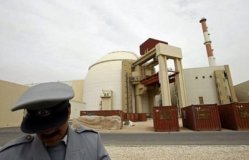The European Union has adopted a new packageof sanctions against Iran, targeting the Islamic Republic's foreign trade, banking and energy sectors.
The sanctions, which were agreed to in principle by EU leaders in June, are the latest in a series of measures taken by the international community in an effort to disrupt Tehran's nuclear program.
Iran, meanwhile, has sent a letter to the International Atomic Energy Agency stating that it is ready to resume negotiations about a nuclear fuel swap without any preconditions, according to the country's state media.
The new EU measures, formally adopted on Monday at a meeting of the bloc's foreign affairs council, will come into force in the next few weeks, after they are published in the EU's official gazette, officials said.
They will include a ban on the sale of equipment, technology and services to Iran's energy sector and come a month after the United States passed similar sanctions.
Move criticized
Ramin Mehmanparast, an Iranian foreign ministry spokesman, denounced the EU decision.
"Moving toward confrontational measures and supporting unilateral actions and damaging the atmosphere are not considered by us to be a good use of the opportunity," he said.
The latest EU and US restrictions come on top of a fourth round of sanctions imposed last month by the United Nations Security Council.
Western powers believe Iran is trying to develop nuclear weapons, but Tehran insists its nuclear program has purely peaceful intentions.
The Security Council endorsed the latest round of sanctions after failing to get Iran to accept a UN-drafted plan to swap its low-enriched uranium for higher-enriched uranium in the form of fuel rods it needs for a medical research reactor.
Iran, Turkey and Brazil announced their own fuel-swap dealon May 17, but it was cold-shouldered by other members of the international community.
One day after the announcement, US Secretary of State Hillary Clinton told Congress that the permanent members of the Security Council had agreed to push forward a fourth round of sanctions, while the White House said it still had "serious concerns" about Iran's nuclear program.
Iran responds
Iran's Monday letter to the IAEA represents a response to those concerns.
"We are ready to resume negotiations on [a] nuclear fuel swap deal as a humanitarian project within IAEA activities without any preconditions," Iran's envoy to the IAEA, Ali-Asghar Soltaniyeh, said according to the Islamic Republic News Agency (IRNA).
The IAEA confirmed it had received the letter and had relayed the message to Brazil, Turkey and the other members of the "Vienna Group" - Russia, France and the United States.
Speaking after the EU council meeting, Catherine Ashton, the union's foreign affairs chief, said she welcomed the news of Iran's letter but needed to "study the details".
The IAEA declined to comment about the letter's content, and it remained unclear whether Iran had addressed major concerns, including whether it would continue to enrich its uranium up to 20 per cent - a violation of Security Council resolutions - and whether it would agree to more inspections and an overall discussions of its entire nuclear programme.
Soltaniyeh said that IAEA Chief Yukiya Amano "welcomed Iran’s response and underlined that he will fully back the move and will do his best to hold the meeting on nuclear swap deal at the earliest opportunity," according to IRNA.
'Dramatic effects'
Laurence Lee, Al Jazeera's correspondent in Brussels, said the EU sanctions could dramatically affect the Iranian economy.
"As well as things like stopping Iranian banks with links to the Revolutionary Guard from operating in Europe, the key thing is that in the future, European countries, which have very strong ties to Iran, won't be able to offer technical assistance to Iran in things like refining oil," he said.
"Iran is a major producer of oil, but doesn't refine it very well ... [the sanctions] will dramatically affect the Iranian economy."
Canada on Monday also imposed similar sanctions, including a ban on any new Canadian investment in Iran's oil and gas sector and restrictions on exporting goods that could be used in nuclear programs.
Iranian banks will also will be barred from opening branches in Canada and Canadian banks will not be able to operate in Iran.
In the EU council's press release, the foreign ministers reaffirmed the bloc's "longstanding commitment" to finding a diplomatic solution to the Iranian nuclear dispute.
Ahmet Davutoglu, Turkey's foreign minister, said on Sunday after a meeting with his Iranian and Brazilian counterparts that Iran may meet with the EU for nuclear talks after the end of the Islamic holy month of Ramadan in September.
"Our aim is to bring Iran back to the negotiating table," Werner Hoyer, a German secretary of state, said.
"We're offering our hand, and all they have to do is to take it."
PHOTO CAPTION
An Iranian security guard stands in front of the Bushehr nuclear power plant in Bushehr.
Al-Jazeera


 Home
Home Discover Islam
Discover Islam Quran Recitations
Quran Recitations Lectures
Lectures
 Fatwa
Fatwa Articles
Articles Fiqh
Fiqh E-Books
E-Books Boys & Girls
Boys & Girls  Ramadan
Ramadan Fatwa Audios
Fatwa Audios Month of Mercy
Month of Mercy Women
Women Eed Al- Fitr
Eed Al- Fitr Food Recipes
Food Recipes Videos
Videos

 Prayer Times
Prayer Times












